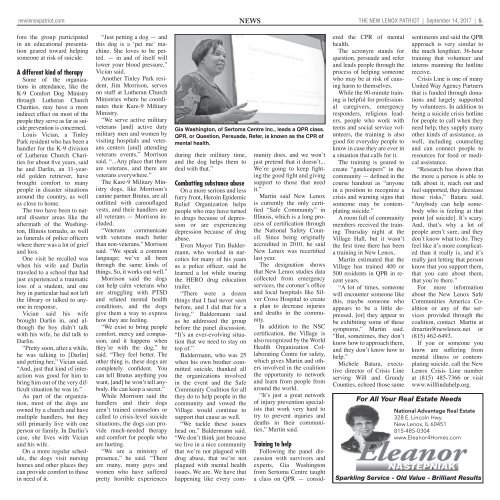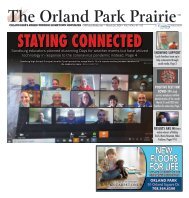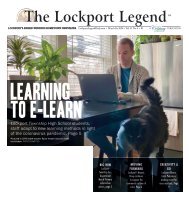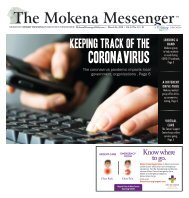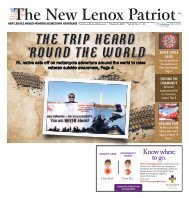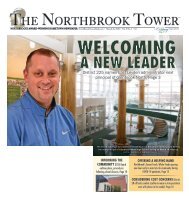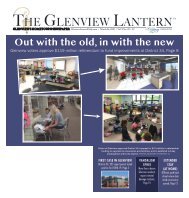You also want an ePaper? Increase the reach of your titles
YUMPU automatically turns print PDFs into web optimized ePapers that Google loves.
newlenoxpatriot.com news<br />
the New Lenox Patriot | September 14, 2017 | 5<br />
fore the group participated<br />
in an educational presentation<br />
geared toward helping<br />
someone at risk of suicide.<br />
A different kind of therapy<br />
Some of the organizations<br />
in attendance, like the<br />
K-9 Comfort Dog Ministry<br />
through Lutheran Church<br />
Charities, may have a more<br />
indirect effect on most of the<br />
people they serve as far as suicide<br />
prevention is concerned.<br />
Louis Vician, a Tinley<br />
Park resident who has been a<br />
handler for the K-9 division<br />
of Lutheran Church Charities<br />
for about five years, said<br />
he and Darlin, an 11-yearold<br />
golden retriever, have<br />
brought comfort to many<br />
people in disaster situations<br />
around the country, as well<br />
as close to home.<br />
The two have been to natural<br />
disaster areas like the<br />
aftermath of the Washington,<br />
Illinois tornado, as well<br />
as funerals of police officers<br />
where there was a lot of grief<br />
and loss.<br />
One visit he recalled was<br />
when his wife and Darlin<br />
traveled to a school that had<br />
just experienced a traumatic<br />
loss of a student, and one<br />
boy in particular had not left<br />
the library or talked to anyone<br />
in response.<br />
Vician said his wife<br />
brought Darlin in, and although<br />
the boy didn’t talk<br />
with his wife, he did talk to<br />
Darlin.<br />
“Pretty soon, after a while,<br />
he was talking to [Darlin]<br />
and petting her,” Vician said.<br />
“And, just that kind of interaction<br />
was good for him to<br />
bring him out of the very difficult<br />
situation he was in.”<br />
As part of the organization,<br />
most of the dogs are<br />
owned by a church and have<br />
multiple handlers, but they<br />
still primarily live with one<br />
person or family. In Darlin’s<br />
case, she lives with Vician<br />
and his wife.<br />
On a more regular schedule,<br />
the dogs visit nursing<br />
homes and other places they<br />
can provide comfort to those<br />
in need of it.<br />
“Just petting a dog — and<br />
this dog is a ‘pet me’ machine.<br />
She loves to be petted.<br />
— in and of itself will<br />
lower your blood pressure,”<br />
Vician said.<br />
Another Tinley Park resident,<br />
Jim Morrison, serves<br />
on staff at Lutheran Church<br />
Ministries where he coordinates<br />
their Kare-9 Military<br />
Ministry.<br />
“We serve active military<br />
veterans [and] active duty<br />
military men and women by<br />
visiting hospitals and veterans<br />
centers [and] attending<br />
veterans events,” Morrison<br />
said. “...Any place that there<br />
are veterans, and there are<br />
veterans everywhere.”<br />
The Kare-9 Military Ministry<br />
dogs, like Morrison’s<br />
canine partner Brutus, are all<br />
outfitted with camouflaged<br />
vests, and their handlers are<br />
all veterans — Morrison included.<br />
“Veterans communicate<br />
with veterans much better<br />
than non-veterans,” Morrison<br />
said. “We speak a common<br />
language; we’ve all been<br />
through the same kinds of<br />
things. So, it works out well.”<br />
Morrison said the dogs<br />
can help calm veterans who<br />
are struggling with PTSD<br />
and related mental health<br />
conditions, and the dogs<br />
give them a way to express<br />
how they are feeling.<br />
“We exist to bring people<br />
comfort, mercy and compassion,<br />
and it happens when<br />
they’re with the dog,” he<br />
said. “They feel better. The<br />
other thing is, these dogs are<br />
completely confident. You<br />
can tell Brutus anything you<br />
want, [and] he won’t tell anybody.<br />
He can keep a secret.”<br />
While Morrison said the<br />
handlers and their dogs<br />
aren’t trained counselors or<br />
called to crisis-level suicide<br />
situations, the dogs can provide<br />
much-needed therapy<br />
and comfort for people who<br />
are hurting.<br />
“We are a ministry of<br />
presence,” he said. “There<br />
are many, many guys and<br />
women who have suffered<br />
pretty horrible experiences<br />
Gia Washington, of Sertoma Centre Inc., leads a QPR class.<br />
QPR, or Question, Persuade, Refer, is known as the CPR of<br />
mental health.<br />
during their military time,<br />
and the dog helps them to<br />
deal with that.”<br />
Combatting substance abuse<br />
On a more serious and less<br />
furry front, Heroin Epidemic<br />
Relief Organization helps<br />
people who may have turned<br />
to drugs because of depression<br />
or are experiencing<br />
depression because of drug<br />
abuse.<br />
Even Mayor Tim Baldermann,<br />
who worked in narcotics<br />
for many of his years<br />
as a police officer, said he<br />
learned a lot while touring<br />
the HERO drug education<br />
trailer.<br />
“There were a dozen<br />
things that I had never seen<br />
before, and I did that for a<br />
living,” Baldermann said<br />
as he addressed the group<br />
before the panel discussion.<br />
“It’s an ever-evolving situation<br />
that we need to stay on<br />
top of.”<br />
Baldermann, who was 25<br />
when his own brother committed<br />
suicide, thanked all<br />
the organizations involved<br />
in the event and the Safe<br />
Community Coalition for all<br />
they do to help people in the<br />
community and vowed the<br />
Village would continue to<br />
support that cause as well.<br />
“We tackle these issues<br />
head on,” Baldermann said.<br />
“We don’t think just because<br />
we live in a nice community<br />
that we’re not plagued with<br />
drug abuse, that we’re not<br />
plagued with mental health<br />
issues. We are. We have that<br />
happening like every community<br />
does, and we won’t<br />
just pretend that it doesn’t...<br />
We’re going to keep fighting<br />
the good fight and giving<br />
support to those that need<br />
it.”<br />
Martin said New Lenox<br />
is currently the only certified<br />
“Safe Community” in<br />
Illinois, which is a long process<br />
of certification through<br />
the National Safety Council.<br />
Since being originally<br />
accredited in 2010, he said<br />
New Lenox was recertified<br />
last year.<br />
The designation shows<br />
that New Lenox studies data<br />
collected from emergency<br />
services, the coroner’s office<br />
and local hospitals like Silver<br />
Cross Hospital to create<br />
a plan to decrease injuries<br />
and deaths in the community.<br />
In addition to the NSC<br />
certification, the Village is<br />
also recognized by the World<br />
Health Organization Collaborating<br />
Centre for safety,<br />
which gives Martin and others<br />
involved in the coalition<br />
the opportunity to network<br />
and learn from people from<br />
around the world.<br />
“It’s just a great network<br />
of injury prevention specialists<br />
that work very hard to<br />
try to prevent injuries and<br />
deaths in their communities,”<br />
Martin said.<br />
Training to help<br />
Following the panel discussion<br />
with survivors and<br />
experts, Gia Washington<br />
from Sertoma Centre taught<br />
a class on QPR — considered<br />
the CPR of mental<br />
health.<br />
The acronym stands for<br />
question, persuade and refer<br />
and leads people through the<br />
process of helping someone<br />
who may be at risk of causing<br />
harm to themselves.<br />
While the 90-minute training<br />
is helpful for professional<br />
caregivers, emergency<br />
responders, religious leaders,<br />
people who work with<br />
teens and social service volunteers,<br />
the training is also<br />
good for everyday people to<br />
know in case they are ever in<br />
a situation that calls for it.<br />
The training is geared to<br />
create “gatekeepers” in the<br />
community — defined in the<br />
course handout as “anyone<br />
in a position to recognize a<br />
crisis and warning signs that<br />
someone may be contemplating<br />
suicide.”<br />
A room full of community<br />
members received the training<br />
Thursday night at the<br />
Village Hall, but it wasn’t<br />
the first time there has been<br />
a training in New Lenox.<br />
Martin estimated that the<br />
Village has trained 400 or<br />
500 residents in QPR in recent<br />
years.<br />
“A lot of times, someone<br />
will encounter someone like<br />
this, maybe someone who<br />
appears to be a little depressed,<br />
[or] they appear to<br />
be exhibiting some of these<br />
symptoms,” Martin said.<br />
“But, sometimes, they don’t<br />
know how to approach them,<br />
and they don’t know how to<br />
help.”<br />
Michele Batara, executive<br />
director of Crisis Line<br />
serving Will and Grundy<br />
Counties, echoed those same<br />
sentiments and said the QPR<br />
approach is very similar to<br />
the much lengthier, 36-hour<br />
training that volunteer and<br />
interns manning the hotline<br />
receive.<br />
Crisis Line is one of many<br />
United Way Agency Partners<br />
that is funded through donations<br />
and largely supported<br />
by volunteers. In addition to<br />
being a suicide crisis hotline<br />
for people to call when they<br />
need help, they supply many<br />
other kinds of assistance, as<br />
well, including counseling<br />
and can connect people to<br />
resources for food or medical<br />
assistance.<br />
“Research has shown that<br />
the more a person is able to<br />
talk about it, reach out and<br />
feel supported, they decrease<br />
those risks,” Batara said.<br />
“Anybody can help somebody<br />
who is feeling at that<br />
point [of suicide]. It’s scary.<br />
And, that’s why a lot of<br />
people aren’t sure, and they<br />
don’t know what to do. They<br />
feel like it’s more complicated<br />
than it really is, and it’s<br />
really just letting that person<br />
know that you support them,<br />
that you care about them,<br />
that you’re there.”<br />
For more information<br />
about the New Lenox Safe<br />
Communities America Coalition<br />
or any of the services<br />
provided through the<br />
coalition, contact Martin at<br />
dmartin@newlenox.net or<br />
(815) 462-6493.<br />
If you or someone you<br />
know are suffering from<br />
mental illness or contemplating<br />
suicide, call the New<br />
Lenox Crisis Line number<br />
at (815) 485-7366 or visit<br />
www.willfinduhelp.org.<br />
For All Your Real Estate Needs<br />
National Advantage Real Estate<br />
328 E. Lincoln Hwy.<br />
New Lenox, IL 60451<br />
815-485-0304<br />
www.Eleanor4Homes.com<br />
Sparkling Service - Old Value - Brilliant Results


